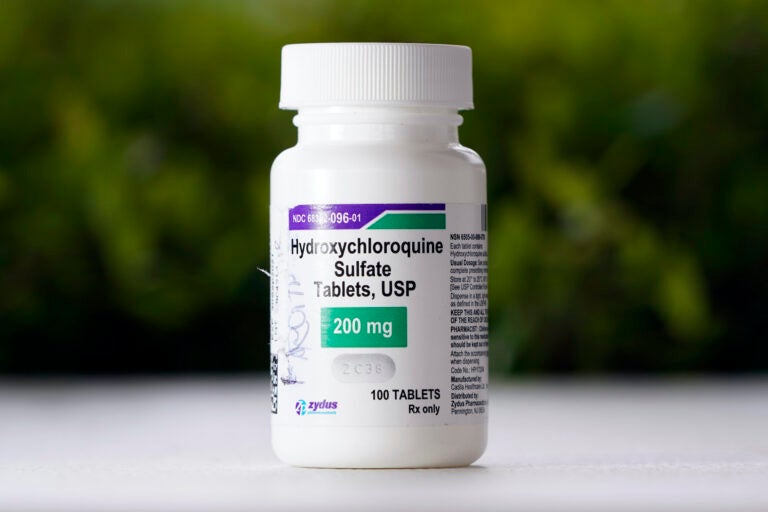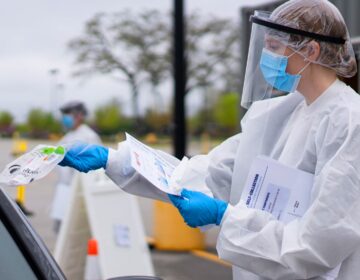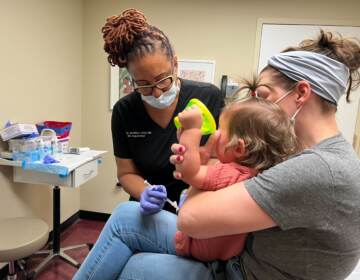Don’t treat COVID-19 with hydroxychloroquine, American College of Physicians says
The American College of Physicians says there are risks to using the anti-malarial drug on patients, and no benefit. Monitored clinical trials are advised.
Listen 1:44
This Tuesday, April 7, 2020 file photo shows a bottle of hydroxychloroquine tablets in Texas City, Texas. (David J. Phillip/AP Photo)
Are you on the front lines of the coronavirus? Help us report on the pandemic.
The American College of Physicians says doctors should not treat COVID-19 patients with hydroxychloroquine outside the context of a clinical trial.
The anti-malaria drug is used to treat lupus and other autoimmune diseases. It was in short supply in late March after President Donald Trump cited a small early study and touted it as a promising treatment. The Food and Drug Administration granted emergency use authorization for the use of hydroxychloroquine to treat COVID-19 in late March, saying it might be effective and there was no available alternative.
But in late April, the FDA cautioned against the use of hydroxychloroquine for COVID-19, saying it had received reports of serious heart rhythm problems and dangerous rapid heart rates. Earlier this month, the American College of Physicians and a panel at the National Institutes of Health reviewed the evidence. They have separately published guidelines to medical staff saying not to use the drug either as a treatment for COVID-19 or to try to prevent COVID-19.
Jacqueline Fincher, president of the American College of Physicians, said that right now there is no scientific evidence that the drug works against COVID-19.
“Everything we do is risk versus benefits,” Fincher said. “You don’t want to treat a patient with any medication or any treatment that has all risk associated with it and no benefit, and that is where we are with hydroxychloroquine.”
On Monday, President Trump said he is taking hydroxychloroquine to try to prevent COVID-19. He has denounced a study that found treating coronavirus-infected patients with the drug led to more of them dying as a “Trump enemy statement.”
Citing the risks, Temple Health, Einstein Healthcare Network, Jefferson Health, and Main Line Health said they are not using hydroxychloroquine to treat COVID patients.
Temple Health is using it only in the context of two ongoing clinical trials to figure out whether the drug can treat patients and health care workers who have COVID-19.

Get daily updates from WHYY News!
There are more such trials happening across the country. The American College of Physicians’ guidance also says the drug should be used only in the context of a clinical trial in which patients are monitored for any side effects.
However, the public debate over hydroxychloroquine has actually harmed the very clinical trials designed to find out how useful the drug is, as reported by NPR on Wednesday. Doctors reported patients do not want to join clinical trials for hydroxychloroquine anymore.
Several doctors and researchers wrote in an editorial for the New England Journal of Medicine in early May that “it is disappointing that several months into the pandemic, we do not yet have results from controlled trials of a therapy that is being widely used” because doctors have already had to make the difficult choice of whether to treat COVID-19 patients with hydroxychloroquine, probably in the hundreds of thousands, “with scant evidence about the risks and benefits.”
Fincher said that the American College of Physicians guidelines about hydroxychloroquine will be updated as new evidence comes in, and that there may be similar expert reviews of other COVID-19 treatments in the coming weeks.
WHYY is your source for fact-based, in-depth journalism and information. As a nonprofit organization, we rely on financial support from readers like you. Please give today.




![CoronavirusPandemic_1024x512[1]](https://whyy.org/wp-content/uploads/2020/03/CoronavirusPandemic_1024x5121-300x150.jpg)


